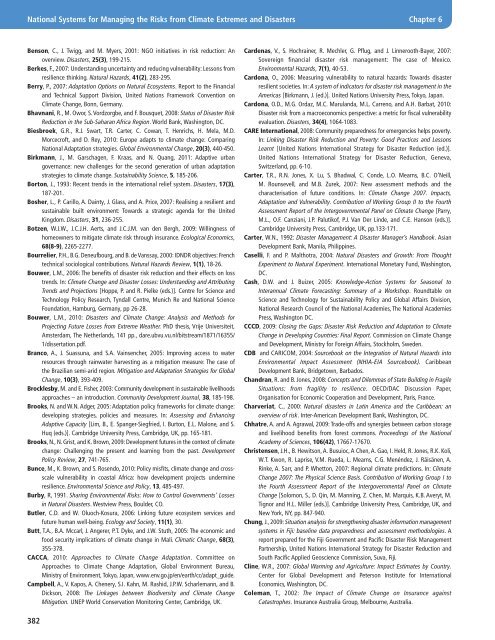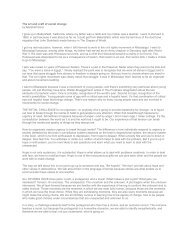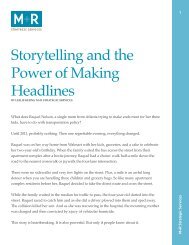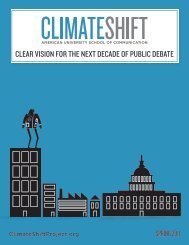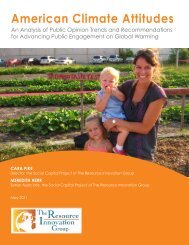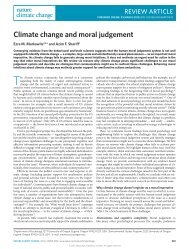National Systems for <strong>Managing</strong> the <strong>Risks</strong> from <strong>Climate</strong> <strong>Extreme</strong>s and DisastersChapter 6Benson, C., J. Twigg, and M. Myers, 2001: NGO initiatives in risk reduction: Anoverview. Disasters, 25(3), 199-215.Berkes, F., 2007: Understanding uncertainty and reducing vulnerability: Lessons fromresilience thinking. Natural Hazards, 41(2), 283-295.Berry, P., 2007: Adaptation Options on Natural Ecosystems. Report to the Financialand Technical Support Division, United Nations Framework Convention on<strong>Climate</strong> Change, Bonn, Germany.Bhavnani, R., M. Owor, S. Vordzorgbe, and F. Bousquet, 2008: Status <strong>of</strong> Disaster RiskReduction in the Sub-Saharan Africa Region. World Bank, Washington, DC.Biesbroek, G.R., R.J. Swart, T.R. Carter, C. Cowan, T. Henrichs, H. Mela, M.D.Morcecr<strong>of</strong>t, and D. Rey, 2010: Europe adapts to climate change: ComparingNational Adaptation strategies. Global Environmental Change, 20(3), 440-450.Birkmann, J., M. Garschagen, F. Kraas, and N. Quang, 2011: Adaptive urbangovernance: new challenges for the second generation <strong>of</strong> urban adaptationstrategies to climate change. Sustainability Science, 5, 185-206.Borton, J., 1993: Recent trends in the international relief system. Disasters, 17(3),187-201.Bosher, L., P. Carillo, A. Dainty, J. Glass, and A. Price, 2007: Realising a resilient andsustainable built environment: Towards a strategic agenda for the UnitedKingdom. Disasters, 31, 236-255.Botzen, W.J.W., J.C.J.H. Aerts, and J.C.J.M. van den Bergh, 2009: Willingness <strong>of</strong>homeowners to mitigate climate risk through insurance. Ecological Economics,68(8-9), 2265-2277.Bourrelier, P.H., B.G. Deneufbourg, and B. de Vanssay, 2000: IDNDR objectives: Frenchtechnical sociological contributions. Natural Hazards Review, 1(1), 18-26.Bouwer, L.M., 2006: The benefits <strong>of</strong> disaster risk reduction and their effects on losstrends. In: <strong>Climate</strong> Change and Disaster Losses: Understanding and AttributingTrends and Projections [Hoppe, P. and R. Pielke (eds.)]. Centre for Science andTechnology Policy Research, Tyndall Centre, Munich Re and National ScienceFoundation, Hamburg, Germany, pp 26-28.Bouwer, L.M., 2010: Disasters and <strong>Climate</strong> Change: Analysis and Methods forProjecting Future Losses from <strong>Extreme</strong> Weather. PhD thesis, Vrije Universiteit,Amsterdam, The Netherlands, 141 pp., dare.ubvu.vu.nl/bitstream/1871/16355/1/dissertation.<strong>pdf</strong>.Branco, A., J. Suassuna, and S.A. Vainsencher, 2005: Improving access to waterresources through rainwater harvesting as a mitigation measure: The case <strong>of</strong>the Brazilian semi-arid region. Mitigation and Adaptation Strategies for GlobalChange, 10(3), 393-409.Brocklesby, M. and E. Fisher, 2003: Community development in sustainable livelihoodsapproaches – an introduction. Community Development Journal, 38, 185-198.Brooks, N. and W.N. Adger, 2005: Adaptation policy frameworks for climate change:developing strategies, policies and measures. In: Assessing and EnhancingAdaptive Capacity [Lim, B., E. Spanger-Siegfried, I. Burton, E.L. Malone, and S.Huq (eds.)]. Cambridge University Press, Cambridge, UK, pp. 165-181.Brooks, N., N. Grist, and K. Brown, 2009: Development futures in the context <strong>of</strong> climatechange: Challenging the present and learning from the past. DevelopmentPolicy Review, 27, 741-765.Bunce, M., K. Brown, and S. Rosendo, 2010: Policy misfits, climate change and crossscalevulnerability in coastal Africa: how development projects undermineresilience. Environmental Science and Policy, 13, 485-497.Burby, R, 1991. Sharing Environmental <strong>Risks</strong>: How to Control Governments’ Lossesin Natural Disasters. Westview Press, Boulder, CO.Butler, C.D. and W. Oluoch-Kosura, 2006: Linking future ecosystem services andfuture human well-being. Ecology and Society, 11(1), 30.Butt, T.A., B.A. Mccarl, J. Angerer, P.T. Dyke, and J.W. Stuth, 2005: The economic andfood security implications <strong>of</strong> climate change in Mali. Climatic Change, 68(3),355-378.CACCA, 2010: Approaches to <strong>Climate</strong> Change Adaptation. Committee onApproaches to <strong>Climate</strong> Change Adaptation, Global Environment Bureau,Ministry <strong>of</strong> Environment, Tokyo, Japan, www.env.go.jp/en/earth/cc/adapt_guide.Campbell, A., V. Kapos, A. Chenery, S.I. Kahn, M. Rashid, J.P.W. Scharlemann, and B.Dickson, 2008: The Linkages between Biodiversity and <strong>Climate</strong> ChangeMitigation. UNEP World Conservation Monitoring Center, Cambridge, UK.Cardenas, V., S. Hochrainer, R. Mechler, G. Pflug, and J. Linnerooth-Bayer, 2007:Sovereign financial disaster risk management: The case <strong>of</strong> Mexico.Environmental Hazards, 7(1), 40-53.Cardona, O., 2006: Measuring vulnerability to natural hazards: Towards disasterresilient societies. In: A system <strong>of</strong> indicators for disaster risk management in theAmericas [Birkmann, J. (ed.)]. United Nations University Press, Tokyo, Japan.Cardona, O.D., M.G. Ordaz, M.C. Marulanda, M.L. Carreno, and A.H. Barbat, 2010:Disaster risk from a macroeconomics perspective: a metric for fiscal vulnerabilityevaluation. Disasters, 34(4), 1064-1083.CARE International, 2008: Community preparedness for emergencies helps poverty.In: Linking Disaster Risk Reduction and Poverty: Good Practices and LessonsLearnt [United Nations International Strategy for Disaster Reduction (ed.)].United Nations International Strategy for Disaster Reduction, Geneva,Switzerland, pp. 6-10.Carter, T.R., R.N. Jones, X. Lu, S. Bhadwal, C. Conde, L.O. Mearns, B.C. O’Neill,M. Rounsevell, and M.B. Zurek, 2007: New assessment methods and thecharacterisation <strong>of</strong> future conditions. In: <strong>Climate</strong> Change 2007. Impacts,Adaptation and Vulnerability. Contribution <strong>of</strong> Working Group II to the FourthAssessment Report <strong>of</strong> the Intergovernmental Panel on <strong>Climate</strong> Change [Parry,M.L., O.F. Canziani, J.P. Palutik<strong>of</strong>, P.J. Van Der Linde, and C.E. Hanson (eds.)].Cambridge University Press, Cambridge, UK, pp.133-171.Carter, W.N., 1992: Disaster Management: A Disaster Manager’s Handbook. AsianDevelopment Bank, Manila, Philippines.Caselli, F. and P. Malthotra, 2004: Natural Disasters and Growth: From ThoughtExperiment to Natural Experiment. International Monetary Fund, Washington,DC.Cash, D.W. and J. Buizer, 2005: Knowledge-Action Systems for Seasonal toInterannual <strong>Climate</strong> Forecasting: Summary <strong>of</strong> a Workshop. Roundtable onScience and Technology for Sustainability Policy and Global Affairs Division,National Research Council <strong>of</strong> the National Academies, The National AcademiesPress, Washington DC.CCCD, 2009: Closing the Gaps: Disaster Risk Reduction and Adaptation to <strong>Climate</strong>Change in Developing Countries: Final Report. Commission on <strong>Climate</strong> Changeand Development, Ministry for Foreign Affairs, Stockholm, Sweden.CDB and CARICOM, 2004: Sourcebook on the Integration <strong>of</strong> Natural Hazards intoEnvironmental Impact Assessment (NHIA-EIA Sourcebook). CaribbeanDevelopment Bank, Bridgetown, Barbados.Chandran, R. and B. Jones, 2008: Concepts and Dilemmas <strong>of</strong> State Building in FragileSituations: from fragility to resilience. OECD/DAC Discussion Paper,Organisation for Economic Cooperation and Development, Paris, France.Charveriat, C., 2000: Natural disasters in Latin America and the Caribbean: anoverview <strong>of</strong> risk. Inter-American Development Bank, Washington, DC.Chhatre, A. and A. Agrawal, 2009: Trade-<strong>of</strong>fs and synergies between carbon storageand livelihood benefits from forest commons. Proceedings <strong>of</strong> the NationalAcademy <strong>of</strong> Sciences, 106(42), 17667-17670.Christensen, J.H., B. Hewitson, A. Busuioc, A Chen, A. Gao, I. Held, R. Jones, R.K. Koli,W.T. Kwon, R. Laprise, V.M. Rueda, L. Mearns, C.G. Menéndez, J. Räisänen, A.Rinke, A. Sarr, and P. Whetton, 2007: Regional climate predictions. In: <strong>Climate</strong>Change 2007: The Physical Science Basis. Contribution <strong>of</strong> Working Group I tothe Fourth Assessment Report <strong>of</strong> the Intergovernmental Panel on <strong>Climate</strong>Change [Solomon, S., D. Qin, M. Manning, Z. Chen, M. Marquis, K.B. Averyt, M.Tignor and H.L. Miller (eds.)]. Cambridge University Press, Cambridge, UK, andNew York, NY, pp. 847-940.Chung, J., 2009: Situation analysis for strengthening disaster information managementsystems in Fiji: baseline data preparedness and assessment methodologies. Areport prepared for the Fiji Government and Pacific Disaster Risk ManagementPartnership, United Nations International Strategy for Disaster Reduction andSouth Pacific Applied Geoscience Commission, Suva, Fiji.Cline, W.R., 2007: Global Warming and Agriculture: Impact Estimates by Country.Center for Global Development and Peterson Institute for InternationalEconomics, Washington, DC.Coleman, T., 2002: The Impact <strong>of</strong> <strong>Climate</strong> Change on Insurance againstCatastrophes. Insurance Australia Group, Melbourne, Australia.382
Chapter 6National Systems for <strong>Managing</strong> the <strong>Risks</strong> from <strong>Climate</strong> <strong>Extreme</strong>s and DisastersColls, A., N. Ash, and N. Ikkala, 2009: Ecosystem-based Adaptation: A NaturalResponse to <strong>Climate</strong> Change. International Union for Conservation <strong>of</strong> Nature,Gland, Switzerland.Congleton, R.D., 2006: The story <strong>of</strong> Katrina: New Orleans and the political economy<strong>of</strong> catastrophe. Public Choice, 127(1), 5-30.Conway, D. and L. Schipper, 2011: Adaptation to climate change in Africa:Challenges and opportunities identified from Ethiopia. Global EnvironmentalChange, 21(1), 227-237.Coppola, D.P, 2007: Introduction to International Disaster Management.Butterworth-Heinemann, Oxford, UK.Costanza, R., O. Pérez-Maqueo, M.L. Martinez, P. Sutton, S.J. Anderson, and K.Mulder, 2008: The value <strong>of</strong> coastal wetlands for hurricane protection. Ambio,37(4), 241-248.Crabbé, P. and M. Robin, 2006: Institutional adaptation <strong>of</strong> water resource infrastructuresto climate change in eastern Ontario. Climatic Change, 78(1), 103 -133.CRGR, 2007a: Lineamientos generales de organización y funcionamiento de laConcertación Regional de Gestión de Riesgos. Políticas, Prácticas y Gestión delRiesgo, 1(7), 4-7.CRGR, 2007b: Reforma del Estado y gestión del riesgo de desastres. Políticas,Prácticas y Gestión del Riesgo, 2(8), 3-11.CRGR, 2009: Centroamérica frente a los retos del cambio climático. Posicionamientopolítico de la sociedad civil y pueblos indígenas organizados. Políticas, Prácticasy Gestión del Riesgo, 3(12), 12-15.Crowards, T., 2000: Comparative Vulnerability to Natural Disasters in the Caribbean.Caribbean Development Bank, Bridgetown, Barbados.CSA, 2010a: Infrastructure in Permafrost: A Guideline for <strong>Climate</strong> Change Adaptation.A Technical Guide. Canadian Standards Association, Mississauga, Canada.CSA, 2010b: Development, interpretation and use <strong>of</strong> rainfall intensity-durationfrequency(IDF) information: Guideline for Canadian water resources practitioners.Technical Guide, Canadian Standards Association, Mississauga, Canada.Cummins, J., and O. Mahul, 2009: Catastrophe Risk Financing In DevelopingCountries: Principles For Public Intervention. World Bank, Washington, DC.Curriero, F.C., J.A. Patz, J.B. Rose, and S. Lele, 2001: The association between extremeprecipitation and waterborne disease outbreaks in the United States, 1948-1994. American Journal <strong>of</strong> Public Health, 91(8), 1194-1199.Das, S. and J.R. Vincent, 2009: Mangroves protected villages and reduced death tollsduring Indian super cyclone. Proceedings <strong>of</strong> the National Academy <strong>of</strong> Sciences,106(18), 7357-7360.DaSilva, J., B. Garanganga, V. Teveredzi, S.M. Marx, S.J. Mason, and S.J. Connor, 2004:Improving epidemic malaria planning, preparedness and response in SouthernAfrica. Malaria Journal, 3(1), 37.Davies, M., B. Guenther, J. Leavy, T. Mitchell, and T. Tanner, 2008: Adaptive socialprotection synergies for poverty reduction. Institute <strong>of</strong> Development Studies(IDS) Bulletin, 39(4), 105-112.Davis, K. (ed.), 2004: Technology Dissemination among Small-Scale Farmers in MeruCentral District <strong>of</strong> Kenya: Impact <strong>of</strong> Group Participation. USA: University <strong>of</strong>Florida.De Bruin, K., R. Dellink, and S. Agrawala, 2009a: Economic Aspects <strong>of</strong> Adaptation to<strong>Climate</strong> Change: Integrated Assessment Modeling <strong>of</strong> Adaptation Costs andBenefits. Environment Working Paper No. 6, Organisation for EconomicCooperation and Development, Paris, France.De Bruin, K., R.B. Dellink, A. Ruijs, L. Bolwidt, A. van Buuren, J. Graveland, R.S. deGroot, P.J. Kuikman, S. Reinhard, R.P. Roetter, V.C. Tassone, A. Verhagen, and E.C.van Ierland, 2009b: Adapting to climate change in The Netherlands: aninventory <strong>of</strong> climate adaptation options and ranking <strong>of</strong> alternatives. ClimaticChange, 95, 23-45.Debels, P., C. Szlafsztein, P. Aldunce, C. Neri, Y. Carvajal, M. Quintero-Angel, A. Celis, A.Bezanilla, and D. Martinez, 2009: IUPA: A tool for the evaluation <strong>of</strong> the generalusefulness <strong>of</strong> practices for adaptation to climate change and variability. NaturalHazards, 50(2), 211-233.DEFRA, 2005: Making Space for Water. Taking Forward a New Government Strategyfor Flood and Coastal Erosion Risk Management in England. Department forEnvironment, Food and Rural Affairs, London, UK.DEFRA, 2006: The UK’s Fourth National Communication under the United NationsFramework Convention on <strong>Climate</strong> Change. Department for Environment, Foodand Rural Affairs, London, UK.del Ninno, C., 2001: The 1998 Floods in Bangladesh: Disaster Impacts, HouseholdCoping Strategies, and Response. Research Report 122, International FoodPolicy Research Institute, Washington, DC.del Ninno, C., P.A. Dorosh, and L.C. Smith, 2003: Public policy, markets and householdcoping strategies in Bangladesh; Avoiding a food security crisis following the1998 floods. World Development, 31(7), 1221-1238.Dercon, S., 2005: Risk, insurance, and poverty: A review. In: Insurance AgainstPoverty. A study prepared by the World Institute for Development EconomicsResearch <strong>of</strong> the United Nations University (UNU-WIDER)[ Dercon, S. (ed.)].Oxford University Press, Oxford, UK, pp. 9-37.Dessai, S., and M. Hulme, 2007: Assessing the robustness <strong>of</strong> adaptation decisions toclimate change uncertainties: A case study on water resources management inthe East <strong>of</strong> England. Global Environmental Change, 17, 59-72.DFID, 2005: Natural Disaster and Disaster Risk Reduction Measures: A Desk Review<strong>of</strong> Costs and Benefits. UK Department for International Development, TheStationery Office, London, IK.DFID, 2011: Multilateral Aid Review: Ensuring Maximum Value for Money for UK Aidthrough Multilateral Organisations. UK Department for InternationalDevelopment, London, UK.Dilley, M., 2006: Risk identification: A critical component <strong>of</strong> disaster risk management.World Meteorological Organisation Bulletin, 55(1), 13-20.Dolan, A.H. and I.J. Walker, 2006: Understanding vulnerability <strong>of</strong> coastal communities toclimate change related risks. In: Proceedings <strong>of</strong> the 8th Int’l Coastal Symposium.Itajaí, Brazil, 14-18 March 2004. Journal <strong>of</strong> Coastal Research, SI 39, 1316-1323.Dorren, L.K.A., F. Berger, A.C. Imeson, B. Maier, and F. Rey, 2004: Integrity, stabilityand management <strong>of</strong> protection forests in the European Alps. Forest Ecology andManagement, 195(1-2), 165-176.Drabek, T.E., 1986: Human System Responses To Disaster: An Inventory OfSociological Finding. Springer-Verlag New York, NY.Drabek, T.E., 1999: Understanding disaster warning responses. The Social ScienceJournal, 36, 515-523.Dudley, N., S. Stolton, A. Belokurov, L. Krueger, N. Lopoukhine, K. Mackinnon, T.Sandwith, and N. Sekhran, 2010: Natural Solutions: Protected Areas HelpingPeople Cope with <strong>Climate</strong> Change. IUCN, WCPA, TNC, UNDP, WCS, World Bankand WWF, Gland, Switzerland, Washington, DC and New York, NY.Eakin, H., E.L. Tompkins, D.R. Nelson, and J.M. Anderies, 2009: Adapting to climatechange: Thresholds, values, governance. In: Hidden Costs and DisparateUncertainties: Trade-Offs Involved in Approaches to <strong>Climate</strong> Policy [Adger, W.N.,I. Lorenzoni, and L.O.B. Karen (eds.)]. Cambridge University Press, Cambridge,UK, pp. 212-226.Easterling, W.E., P.K. Aggarwal, P. Batima, K.M. Brander, L. Erda, S.M. Howden, A.Kirilenko, J. Morton, J.-F. Soussana, J. Schmidhuber, and F.N. Tubiello, 2007: Food,fibre and forest products. In: <strong>Climate</strong> Change 2007. Impacts, Adaptation andVulnerability. Contribution <strong>of</strong> Working Group II to the Fourth Assessment Report<strong>of</strong> the Intergovernmental Panel on <strong>Climate</strong> Change [Parry, M.L., O.F. Canziani,J.P. Palutik<strong>of</strong>, P.J. Van Der Linde, and C.E. Hanson (eds.)]. Cambridge UniversityPress, Cambridge, UK, pp. 273-313.Ebi, K.L., 2008: Adaptation costs for climate change-related cases <strong>of</strong> diarrhoealdisease, malnutrition, and malaria in 2030. Globalization and Health, 6, 9,doi:10.1186/1744-8603.Ebi, K.L., R.S. Kovats, and B. Menne, 2006. An approach for assessing human healthvulnerability and public health interventions to adapt to climate change.Environmental Health Perspectives, 114, 12, doi:10.1289/Ehp.8430.EC, 2009: Technical Report – 2009 – 040, Guidance Document No. 24, River BasinManagement. In: A Changing <strong>Climate</strong>, Common Implementation Strategy forthe Water Framework. Directive 2000/60/EC. European Commission, Brussels,Belgium.ECA, 2009: Shaping <strong>Climate</strong>-Resilient Development: A Framework For Decision-Making Study. Economics <strong>of</strong> <strong>Climate</strong> Adaptation Working Group, World Bank,Washington, DC.383
- Page 1:
MANAGING THE RISKS OF EXTREMEEVENTS
- Page 5:
Managing the Risks of Extreme Event
- Page 9 and 10:
I Foreword and Preface
- Page 12 and 13:
Prefacein understanding and managin
- Page 17 and 18:
Summary for PolicymakersBox SPM.1 |
- Page 19 and 20:
Summary for PolicymakersB.or sub-na
- Page 21 and 22:
Summary for PolicymakersIt is likel
- Page 23:
Summary for Policymakersmicro-insur
- Page 27 and 28:
Summary for PolicymakersIt is very
- Page 29 and 30:
Summary for PolicymakersOther low-r
- Page 31 and 32:
Summary for PolicymakersTable SPM.1
- Page 33 and 34:
Summary for PolicymakersBox SPM.2 |
- Page 35:
III Chapters 1 to 9
- Page 38 and 39:
Climate Change: New Dimensions in D
- Page 40 and 41:
Climate Change: New Dimensions in D
- Page 42 and 43:
Climate Change: New Dimensions in D
- Page 44 and 45:
Climate Change: New Dimensions in D
- Page 46 and 47:
Climate Change: New Dimensions in D
- Page 48 and 49:
Climate Change: New Dimensions in D
- Page 50 and 51:
Climate Change: New Dimensions in D
- Page 52 and 53:
Climate Change: New Dimensions in D
- Page 54 and 55:
Climate Change: New Dimensions in D
- Page 56 and 57:
Climate Change: New Dimensions in D
- Page 58 and 59:
Climate Change: New Dimensions in D
- Page 60 and 61:
Climate Change: New Dimensions in D
- Page 62 and 63:
Climate Change: New Dimensions in D
- Page 64 and 65:
Climate Change: New Dimensions in D
- Page 66 and 67:
Climate Change: New Dimensions in D
- Page 68 and 69:
Climate Change: New Dimensions in D
- Page 70 and 71:
Climate Change: New Dimensions in D
- Page 72 and 73:
Climate Change: New Dimensions in D
- Page 74 and 75:
Climate Change: New Dimensions in D
- Page 76 and 77:
Climate Change: New Dimensions in D
- Page 78 and 79:
Determinants of Risk: Exposure and
- Page 80 and 81:
Determinants of Risk: Exposure and
- Page 82 and 83:
Determinants of Risk: Exposure and
- Page 84 and 85:
Determinants of Risk: Exposure and
- Page 86 and 87:
Determinants of Risk: Exposure and
- Page 88 and 89:
Determinants of Risk: Exposure and
- Page 90 and 91:
Determinants of Risk: Exposure and
- Page 92 and 93:
Determinants of Risk: Exposure and
- Page 94 and 95:
Determinants of Risk: Exposure and
- Page 96 and 97:
Determinants of Risk: Exposure and
- Page 98 and 99:
Determinants of Risk: Exposure and
- Page 100 and 101:
Determinants of Risk: Exposure and
- Page 102 and 103:
Determinants of Risk: Exposure and
- Page 104 and 105:
Determinants of Risk: Exposure and
- Page 106 and 107:
Determinants of Risk: Exposure and
- Page 108 and 109:
Determinants of Risk: Exposure and
- Page 110 and 111:
Determinants of Risk: Exposure and
- Page 112 and 113:
Determinants of Risk: Exposure and
- Page 114 and 115:
Determinants of Risk: Exposure and
- Page 116 and 117:
Determinants of Risk: Exposure and
- Page 118 and 119:
Determinants of Risk: Exposure and
- Page 120 and 121:
Determinants of Risk: Exposure and
- Page 122 and 123:
Changes in Climate Extremes and the
- Page 124 and 125:
Changes in Climate Extremes and the
- Page 126 and 127:
Changes in Climate Extremes and the
- Page 128 and 129:
Changes in Climate Extremes and the
- Page 130 and 131:
Changes in Climate Extremes and the
- Page 132 and 133:
Changes in Climate Extremes and the
- Page 134 and 135:
Changes in Climate Extremes and the
- Page 136 and 137:
Changes in Climate Extremes and the
- Page 138 and 139:
Changes in Climate Extremes and the
- Page 140 and 141:
Changes in Climate Extremes and the
- Page 142 and 143:
Changes in Climate Extremes and the
- Page 144 and 145:
Changes in Climate Extremes and the
- Page 146 and 147:
Changes in Climate Extremes and the
- Page 148 and 149:
Changes in Climate Extremes and the
- Page 150 and 151:
138much of the continental United S
- Page 152 and 153:
Changes in Climate Extremes and the
- Page 154 and 155:
Changes in Climate Extremes and the
- Page 156 and 157:
Changes in Climate Extremes and the
- Page 158 and 159:
Changes in Climate Extremes and the
- Page 160 and 161:
Changes in Climate Extremes and the
- Page 162 and 163:
Changes in Climate Extremes and the
- Page 164 and 165:
Changes in Climate Extremes and the
- Page 166 and 167:
Changes in Climate Extremes and the
- Page 168 and 169:
Changes in Climate Extremes and the
- Page 170 and 171:
Changes in Climate Extremes and the
- Page 172 and 173:
Changes in Climate Extremes and the
- Page 174 and 175:
Changes in Climate Extremes and the
- Page 176 and 177:
Changes in Climate Extremes and the
- Page 178 and 179:
Changes in Climate Extremes and the
- Page 180 and 181:
Changes in Climate Extremes and the
- Page 182 and 183:
Changes in Climate Extremes and the
- Page 184 and 185:
Changes in Climate Extremes and the
- Page 186 and 187:
Changes in Climate Extremes and the
- Page 188 and 189:
Changes in Climate Extremes and the
- Page 190 and 191:
Changes in Climate Extremes and the
- Page 192 and 193:
Changes in Climate Extremes and the
- Page 194 and 195:
Changes in Climate Extremes and the
- Page 196 and 197:
Changes in Climate Extremes and the
- Page 198 and 199:
Changes in Climate Extremes and the
- Page 200 and 201:
Changes in Climate Extremes and the
- Page 202 and 203:
Changes in Climate Extremes and the
- Page 204 and 205:
Changes in Climate Extremes and the
- Page 206 and 207:
Changes in Climate Extremes and the
- Page 208 and 209:
Changes in Climate Extremes and the
- Page 210 and 211:
Changes in Climate Extremes and the
- Page 212 and 213:
Changes in Climate Extremes and the
- Page 214 and 215:
Changes in Climate Extremes and the
- Page 216 and 217:
Changes in Climate Extremes and the
- Page 218 and 219:
Changes in Climate Extremes and the
- Page 220 and 221:
Changes in Climate Extremes and the
- Page 222 and 223:
Changes in Climate Extremes and the
- Page 224 and 225:
Changes in Climate Extremes and the
- Page 226 and 227:
Changes in Climate Extremes and the
- Page 228 and 229:
Changes in Climate Extremes and the
- Page 230 and 231:
Changes in Climate Extremes and the
- Page 232 and 233:
Changes in Climate Extremes and the
- Page 234 and 235:
Changes in Climate Extremes and the
- Page 236 and 237:
Changes in Climate Extremes and the
- Page 238 and 239:
Changes in Climate Extremes and the
- Page 240 and 241:
Changes in Climate Extremes and the
- Page 242 and 243:
Changes in Climate Extremes and the
- Page 244 and 245:
Changes in Impacts of Climate Extre
- Page 246 and 247:
Changes in Impacts of Climate Extre
- Page 248 and 249:
Changes in Impacts of Climate Extre
- Page 250 and 251:
Changes in Impacts of Climate Extre
- Page 252 and 253:
Changes in Impacts of Climate Extre
- Page 254 and 255:
Changes in Impacts of Climate Extre
- Page 256 and 257:
Changes in Impacts of Climate Extre
- Page 258 and 259:
Changes in Impacts of Climate Extre
- Page 260 and 261:
Changes in Impacts of Climate Extre
- Page 262 and 263:
Changes in Impacts of Climate Extre
- Page 264 and 265:
Changes in Impacts of Climate Extre
- Page 266 and 267:
Changes in Impacts of Climate Extre
- Page 268 and 269:
Changes in Impacts of Climate Extre
- Page 270 and 271:
Changes in Impacts of Climate Extre
- Page 272 and 273:
Changes in Impacts of Climate Extre
- Page 274 and 275:
Changes in Impacts of Climate Extre
- Page 276 and 277:
Changes in Impacts of Climate Extre
- Page 278 and 279:
Changes in Impacts of Climate Extre
- Page 280 and 281:
Changes in Impacts of Climate Extre
- Page 282 and 283:
Changes in Impacts of Climate Extre
- Page 284 and 285:
Changes in Impacts of Climate Extre
- Page 286 and 287:
Changes in Impacts of Climate Extre
- Page 288 and 289:
Changes in Impacts of Climate Extre
- Page 290 and 291:
Changes in Impacts of Climate Extre
- Page 292 and 293:
Changes in Impacts of Climate Extre
- Page 294 and 295:
Changes in Impacts of Climate Extre
- Page 296 and 297:
Changes in Impacts of Climate Extre
- Page 298 and 299:
Changes in Impacts of Climate Extre
- Page 300 and 301:
Changes in Impacts of Climate Extre
- Page 302 and 303:
Changes in Impacts of Climate Extre
- Page 304 and 305:
Managing the Risks from Climate Ext
- Page 306 and 307:
Managing the Risks from Climate Ext
- Page 308 and 309:
Managing the Risks from Climate Ext
- Page 310 and 311:
Managing the Risks from Climate Ext
- Page 312 and 313:
Managing the Risks from Climate Ext
- Page 314 and 315:
Managing the Risks from Climate Ext
- Page 316 and 317:
Managing the Risks from Climate Ext
- Page 318 and 319:
Managing the Risks from Climate Ext
- Page 320 and 321:
Managing the Risks from Climate Ext
- Page 322 and 323:
Managing the Risks from Climate Ext
- Page 324 and 325:
Managing the Risks from Climate Ext
- Page 326 and 327:
Managing the Risks from Climate Ext
- Page 328 and 329:
Managing the Risks from Climate Ext
- Page 330 and 331:
Managing the Risks from Climate Ext
- Page 332 and 333:
Managing the Risks from Climate Ext
- Page 334 and 335:
Managing the Risks from Climate Ext
- Page 336 and 337:
Managing the Risks from Climate Ext
- Page 338 and 339:
Managing the Risks from Climate Ext
- Page 340 and 341:
Managing the Risks from Climate Ext
- Page 342 and 343:
Managing the Risks from Climate Ext
- Page 344 and 345: Managing the Risks from Climate Ext
- Page 346 and 347: Managing the Risks from Climate Ext
- Page 348 and 349: Managing the Risks from Climate Ext
- Page 350 and 351: Managing the Risks from Climate Ext
- Page 352 and 353: National Systems for Managing the R
- Page 354 and 355: National Systems for Managing the R
- Page 356 and 357: National Systems for Managing the R
- Page 358 and 359: National Systems for Managing the R
- Page 360 and 361: National Systems for Managing the R
- Page 362 and 363: National Systems for Managing the R
- Page 364 and 365: National Systems for Managing the R
- Page 366 and 367: National Systems for Managing the R
- Page 368 and 369: National Systems for Managing the R
- Page 370 and 371: National Systems for Managing the R
- Page 372 and 373: National Systems for Managing the R
- Page 374 and 375: National Systems for Managing the R
- Page 376 and 377: National Systems for Managing the R
- Page 378 and 379: National Systems for Managing the R
- Page 380 and 381: National Systems for Managing the R
- Page 382 and 383: National Systems for Managing the R
- Page 384 and 385: National Systems for Managing the R
- Page 386 and 387: National Systems for Managing the R
- Page 388 and 389: National Systems for Managing the R
- Page 390 and 391: National Systems for Managing the R
- Page 392 and 393: National Systems for Managing the R
- Page 396 and 397: National Systems for Managing the R
- Page 398 and 399: National Systems for Managing the R
- Page 400 and 401: National Systems for Managing the R
- Page 402 and 403: National Systems for Managing the R
- Page 404 and 405: National Systems for Managing the R
- Page 406 and 407: Managing the Risks: International L
- Page 408 and 409: Managing the Risks: International L
- Page 410 and 411: Managing the Risks: International L
- Page 412 and 413: Managing the Risks: International L
- Page 414 and 415: Managing the Risks: International L
- Page 416 and 417: Managing the Risks: International L
- Page 418 and 419: Managing the Risks: International L
- Page 420 and 421: Managing the Risks: International L
- Page 422 and 423: Managing the Risks: International L
- Page 424 and 425: Managing the Risks: International L
- Page 426 and 427: Managing the Risks: International L
- Page 428 and 429: Managing the Risks: International L
- Page 430 and 431: Managing the Risks: International L
- Page 432 and 433: Managing the Risks: International L
- Page 434 and 435: Managing the Risks: International L
- Page 436 and 437: Managing the Risks: International L
- Page 438 and 439: Managing the Risks: International L
- Page 440 and 441: Managing the Risks: International L
- Page 442 and 443: Managing the Risks: International L
- Page 444 and 445:
Managing the Risks: International L
- Page 446 and 447:
Managing the Risks: International L
- Page 448 and 449:
Managing the Risks: International L
- Page 450 and 451:
Toward a Sustainable and Resilient
- Page 452 and 453:
Toward a Sustainable and Resilient
- Page 454 and 455:
Toward a Sustainable and Resilient
- Page 456 and 457:
Toward a Sustainable and Resilient
- Page 458 and 459:
Toward a Sustainable and Resilient
- Page 460 and 461:
Toward a Sustainable and Resilient
- Page 462 and 463:
Toward a Sustainable and Resilient
- Page 464 and 465:
Toward a Sustainable and Resilient
- Page 466 and 467:
Toward a Sustainable and Resilient
- Page 468 and 469:
Toward a Sustainable and Resilient
- Page 470 and 471:
Toward a Sustainable and Resilient
- Page 472 and 473:
Toward a Sustainable and Resilient
- Page 474 and 475:
Toward a Sustainable and Resilient
- Page 476 and 477:
Toward a Sustainable and Resilient
- Page 478 and 479:
Toward a Sustainable and Resilient
- Page 480 and 481:
Toward a Sustainable and Resilient
- Page 482 and 483:
Toward a Sustainable and Resilient
- Page 484 and 485:
Toward a Sustainable and Resilient
- Page 486 and 487:
Toward a Sustainable and Resilient
- Page 488 and 489:
Toward a Sustainable and Resilient
- Page 490 and 491:
Toward a Sustainable and Resilient
- Page 492 and 493:
Toward a Sustainable and Resilient
- Page 494 and 495:
Toward a Sustainable and Resilient
- Page 496 and 497:
Toward a Sustainable and Resilient
- Page 498 and 499:
Toward a Sustainable and Resilient
- Page 500 and 501:
Case StudiesChapter 9Table of Conte
- Page 502 and 503:
Case StudiesChapter 99.1. Introduct
- Page 504 and 505:
Case StudiesChapter 9••••
- Page 506 and 507:
Case StudiesChapter 99.2.1.2.3. Hea
- Page 508 and 509:
Case StudiesChapter 9preparedness c
- Page 510 and 511:
Case StudiesChapter 99.2.2.5. Outco
- Page 512 and 513:
Case StudiesChapter 9practices at b
- Page 514 and 515:
Case StudiesChapter 9to implement s
- Page 516 and 517:
Case StudiesChapter 9lined by the w
- Page 518 and 519:
Case StudiesChapter 94.5 million af
- Page 520 and 521:
Case StudiesChapter 9are typically
- Page 522 and 523:
Case StudiesChapter 9heightens vuln
- Page 524 and 525:
Case StudiesChapter 9multi-hazard r
- Page 526 and 527:
Case StudiesChapter 9Bank, 2005b).
- Page 528 and 529:
Case StudiesChapter 9Some federal-l
- Page 530 and 531:
Case StudiesChapter 9develop in a m
- Page 532 and 533:
Case StudiesChapter 9Most states ha
- Page 534 and 535:
Case StudiesChapter 9reduction legi
- Page 536 and 537:
Case StudiesChapter 9countries. Thr
- Page 538 and 539:
Case StudiesChapter 99.2.14. Educat
- Page 540 and 541:
Case StudiesChapter 9to be removed
- Page 542 and 543:
Case StudiesChapter 9can help to ad
- Page 544 and 545:
Case StudiesChapter 9CRED, 2009: EM
- Page 546 and 547:
Case StudiesChapter 9Hallegatte, S.
- Page 548 and 549:
Case StudiesChapter 9Linnerooth-Bay
- Page 550 and 551:
Case StudiesChapter 9O’Neill, M.S
- Page 552 and 553:
Case StudiesChapter 9Skaff, M. and
- Page 554 and 555:
Case StudiesChapter 9Visser, R. and
- Page 557 and 558:
ANNEXI Authors and Expert Reviewers
- Page 559 and 560:
Annex IAuthors and Expert Reviewers
- Page 561 and 562:
Annex IAuthors and Expert Reviewers
- Page 563 and 564:
Annex IAuthors and Expert Reviewers
- Page 565 and 566:
Annex IAuthors and Expert Reviewers
- Page 567 and 568:
ANNEXIIGlossary of TermsThis annex
- Page 569 and 570:
Annex IIGlossary of Termswater vapo
- Page 571 and 572:
Annex IIGlossary of Termsdrought, a
- Page 573 and 574:
Annex IIGlossary of TermsImpactsEff
- Page 575 and 576:
Annex IIGlossary of Termsforcing is
- Page 577 and 578:
ANNEXIIIAcronyms565
- Page 579 and 580:
Annex IIIAcronymsNAMNAONAPANaTechND
- Page 581 and 582:
ANNEXIVList of Major IPCC Reports56
- Page 583 and 584:
Annex IVList of Major IPCC ReportsC
- Page 585 and 586:
Index573
- Page 587 and 588:
Indexresilience building, 378touris
- Page 589 and 590:
IndexEM-DAT database, 364Emissions
- Page 591 and 592:
Indextransformation and, 324See als
- Page 593 and 594:
IndexRisk sharing, 10-11, 397, 523i


